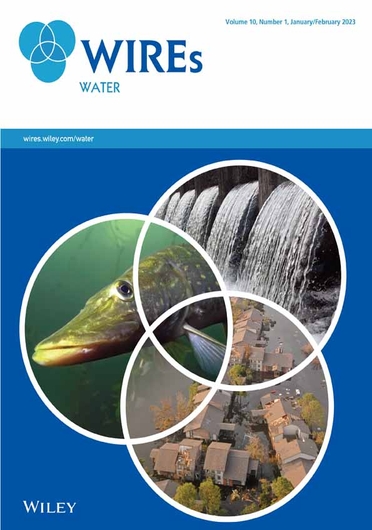Beyond rules and norms: Heterogeneity, ubiquity, and visibility of groundwaters
IF 5.8
1区 地球科学
Q1 ENVIRONMENTAL SCIENCES
引用次数: 3
Abstract
Over the last 150 years or so engineers, farmers, scientists, and many others around the globe have gained access to the waters that lie underground with drilling technology, pumps and cheap energy. Since the mid‐twentieth century, a massive worldwide proliferation of deep wells has redistributed groundwaters away from springs, seeps, wells, and oases, robbing them of the water that supports local sustainable socionatural relations. The idea and social fact of groundwater has emerged in this history, and has three distinguishing features: heterogeneity, ubiquity, and visibility. The failure to halt depletion has prompted a turn to culture in the hope of governing the liquid sustainably. However, rather than grapple with the complexities and contradictions of heterogeneity, ubiquity, and visibility, these efforts take a rather thin view of culture—as rules, norms, and institutions to be studied, codified and deployed to address the crisis. This instrumental understanding of culture as a set of traits to be selectively used for arresting depletion has not proven effective, however, compelling us to rethink our cultural, political, and economic engagements with groundwater.超越规则和规范:地下水的异质性、普遍性和可见性
在过去150年左右的时间里,工程师、农民、科学家和世界各地的许多人都通过钻探技术、水泵和廉价能源获得了地下水。自20世纪中叶以来,深井在世界范围内的大规模扩散,使地下水从泉水、渗水、水井和绿洲中重新分配,剥夺了支持当地可持续社会关系的水。地下水的概念和社会事实是在这段历史中出现的,并具有三个显著特征:异质性、普遍性和可见性。阻止枯竭的失败促使人们转向文化,希望以可持续的方式管理这种液体。然而,这些努力并没有解决异质性、普遍性和可见性的复杂性和矛盾性,而是将文化视为一种需要研究、编纂和部署以应对危机的规则、规范和制度。然而,这种将文化作为一组有选择地用于阻止枯竭的特征的工具性理解并没有被证明是有效的,这迫使我们重新思考我们与地下水的文化、政治和经济关系。
本文章由计算机程序翻译,如有差异,请以英文原文为准。
求助全文
约1分钟内获得全文
求助全文
来源期刊

Wiley Interdisciplinary Reviews: Water
Environmental Science-Ecology
CiteScore
16.60
自引率
3.70%
发文量
56
期刊介绍:
The WIREs series is truly unique, blending the best aspects of encyclopedic reference works and review journals into a dynamic online format. These remarkable resources foster a research culture that transcends disciplinary boundaries, all while upholding the utmost scientific and presentation excellence. However, they go beyond traditional publications and are, in essence, ever-evolving databases of the latest cutting-edge reviews.
 求助内容:
求助内容: 应助结果提醒方式:
应助结果提醒方式:


